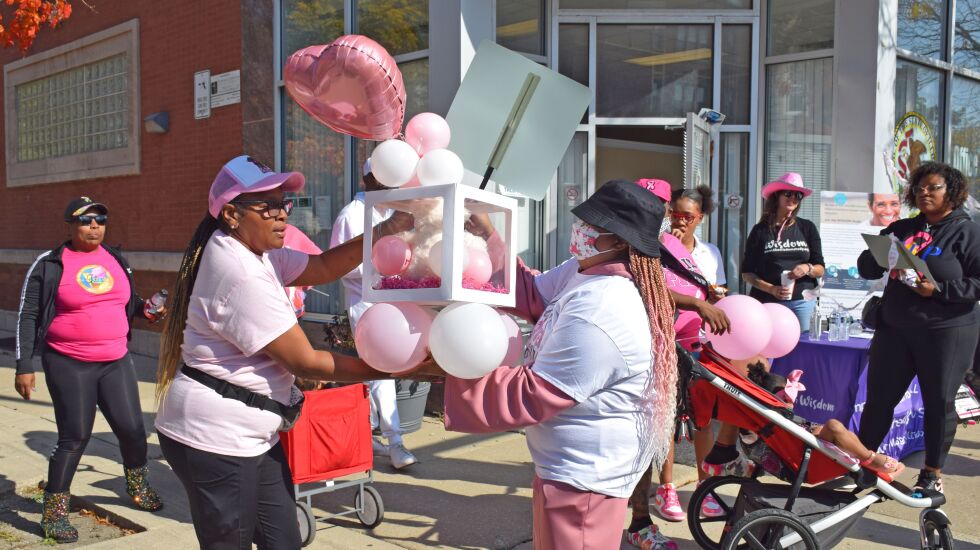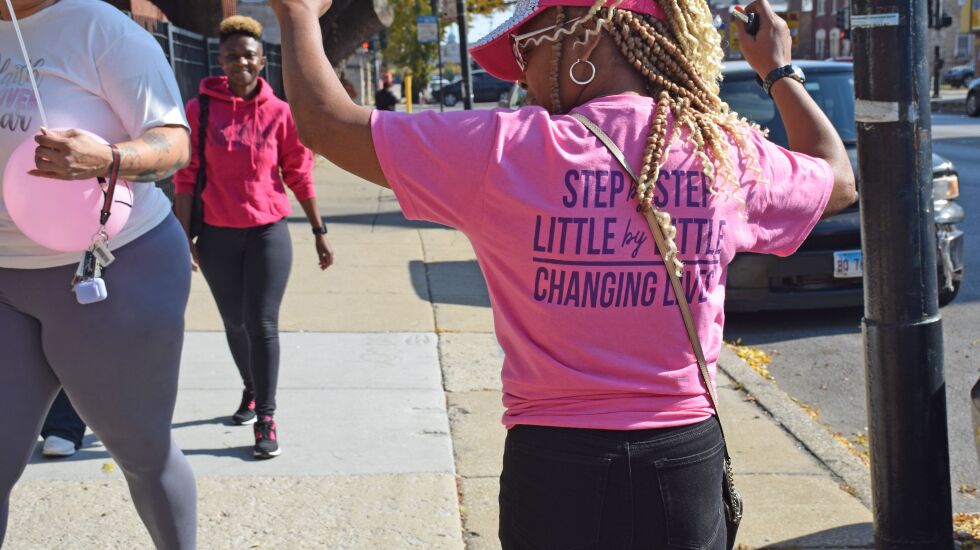
Kenya Johnson was diagnosed with breast cancer at 47 — after her first mammogram.
Getting the scan was a last-minute decision. Her sister was going in for her annual mammogram and persuaded Johnson to tag along. Doctors found a lump, and a biopsy confirmed the diagnosis.
She endured months of chemotherapy and radiation that left her in debilitating pain and with lifelong health problems. After her treatment, Johnson was inspired to serve her community and fellow cancer survivors.
She founded We Care 2 Agency in 2019 to provide a variety of community outreach — including bringing care packages to patients at cancer centers and spreading awareness about free health resources in Chicago.
“I don’t want anyone to go through what I went through alone,” Johnson said. “I’m going to do what I need to do to help the people.”
One effort Johnson works with is a free mammogram program at the University of Chicago that aims to improve breast cancer prevention and reduce access disparities to health care.
The program, called SCORE, offers the free scan to women age 40 or older without health insurance.
Regular health screenings declined significantly during the COVID-19 pandemic. Researchers have warned that delayed cancer screenings will lead to thousands of additional cancer-related deaths.
October is breast cancer awareness month to draw attention to the 44,000 people who die from breast cancer in the U.S. every year and the 200,000 diagnosed annually. The vast majority of breast cancer patients are women.
And in Chicago, Black women are 39% more likely to die from breast cancer compared to white women.
Brenda Gonzales, who coordinates the program and breast cancer studies at University of Chicago Medicine, says SCORE, which started in November 2020, intends to improve health access and preventive care for breast cancer in Chicago.
Most of Gonzales’ work focuses on spreading awareness of the program. On a recent weekend, she had a booth set up at a breast cancer survivor walk, organized by Johnson with We Care 2 Agency, in North Lawndale.

“University of Chicago is this ivory tower in the middle of all this poverty and underserved populations and communities,” Gonzales said. “We have these great resources, but many people don’t know about them.”
Gonzales is the guide for women who come in for their free mammogram. She makes sure they understand the process, she arranges free transportation or free parking, and she sits with patients before their scans.
Once the patient gets her mammogram, a radiologist immediately reviews their results. If they’re clear, the patient goes home. If something shows up on the scan, the patient sees an oncologist that day, and if needed, they are scheduled for a biopsy. All free of charge.
Since the program started, 68 women have come in for a mammogram, and of those, one woman was diagnosed with breast cancer. The hospital helped her enroll in Medicaid, and she continues to get treatment at the University of Chicago.
“We don’t want to give someone a free scan and then just say, ‘bye,’” Gonzales said. “Our goal is to bring them into the medical system and provide them access to care.”
Gonzales’ outreach for SCORE fits with her work on the WISDOM study, one of the University of Chicago’s ongoing breast cancer studies. The study includes nearly 67,000 women from across the U.S., 2,000 of whom are in Chicago.
The women in the study — ages 40-74 with no personal breast cancer history — submit their mammogram results to the study and receive free genetic testing for breast cancer mutations.
WISDOM is managed at the University of Chicago, in part, to help recruit more Black and Brown women for the study, Gonzales said.
She explains the WISDOM study at outreach events and to patients who come in for the free mammogram.
Current guidelines for breast cancer screenings don’t do enough to prevent women from getting late-stage, aggressive breast cancer, says Dr. Olufunmilayo Olopade, an oncologist with University of Chicago who works on the study.
“We now have good treatments that are effective at eliminating cancer, when caught early. We no longer need to see a diagnosis of breast cancer as a death sentence,” Olopade said.
A woman considered higher risk has dense breasts, a family history of breast cancer and tests positive for breast cancer mutations — the most common ones being the BRCA1 or BRCA2 genes.
“The goal of the study is that every woman knows what their risk is, to act and change behaviors and make sure no one comes in with advanced breast cancer,” Olopade said.
“And so we can no longer say that Black women are dying at a higher rate.”
For more about WISDOM: https://www.thewisdomstudy.org/UCM.
For information about SCORE, contact Brenda Gonzales: bgonzales1@uchicagomedicine.org







